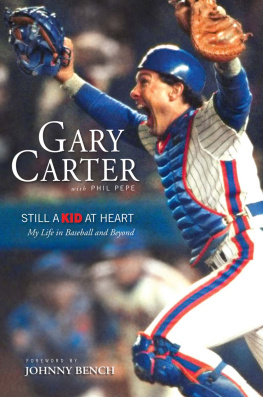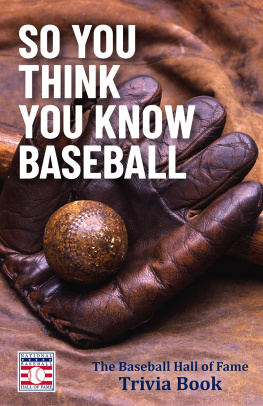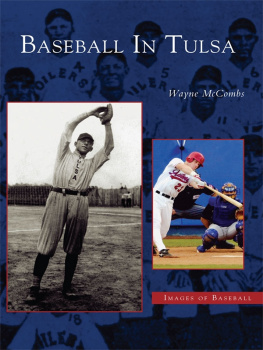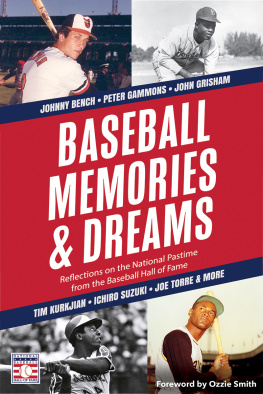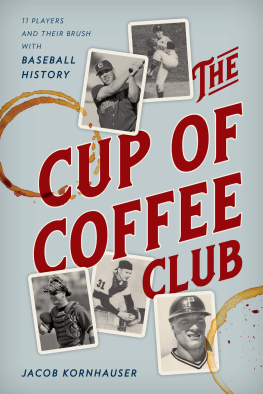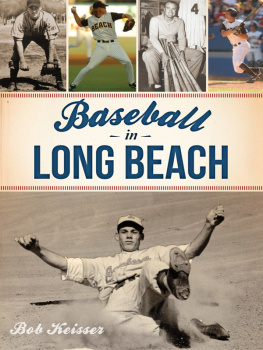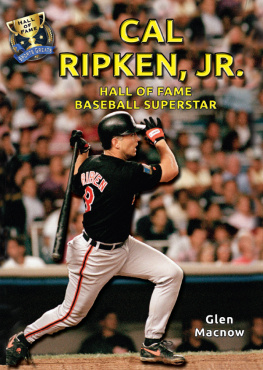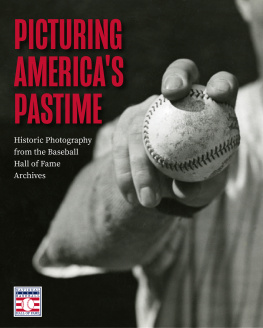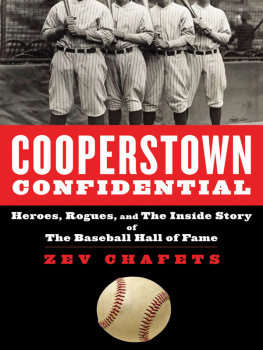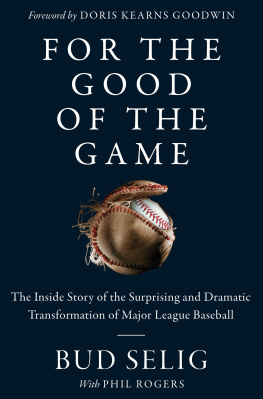Copyright 2008 by Gary Carter and Phil Pepe
No part of this publication may be reproduced, stored in a retrieval system, or transmitted in any form by any means, electronic, mechanical, photocopying, or otherwise, without the prior written permission of the publisher, Triumph Books, 542 South Dearborn Street, Suite 750, Chicago, Illinois 60605.
Triumph Books and colophon are registered trademarks of Random House, Inc.
Library of Congress Cataloging-in-Publication Data
Carter, Gary, 1954
Still a kid at heart : my life in baseball and beyond / Gary Carter and Phil Pepe.
p. cm.
ISBN-13: 978-1-60078-054-7
ISBN-10: 1-60078-054-7
1. Carter, Gary, 1954- 2. Baseball playersUnited StatesBiography. I. Pepe, Phil. II. Title.
GV865.C319A3 2008
796.357092--dc22
[B]
2007051714
This book is available in quantity at special discounts for your group or organization. For further information, contact:
Triumph Books
542 South Dearborn Street
Suite 750
Chicago, Illinois 60605
(312) 939-3330
Fax (312) 663-3557
Printed in U.S.A.
ISBN: 978-1-60078-054-7
Design by Sue Knopf. Production by Amy Carter.
All photos courtesy of Gary Carter unless otherwise noted.
THIS BOOK IS LOVINGLY DEDICATED TO MY WIFE, SANDY, for her unconditional love and devotion through our 33 years of marriage. Her dedication and support have been more than any man could ask for. She has been the best mom our children could want. Christy, Kimmy, and D.J. have turned out to be wonderful young adults, mainly because of her. She has been the backbone and strength to our marriage and the glue that has kept the family together. I am forever grateful and I will always love you.
Contents
Foreword
GROWING OLD IS MANDATORY; GROWING UP IS OPTIONAL, Ive heard! As you read this story of Kids life, you can decide to grow up like Gary, one of my favorite friends in baseball and in life. His passion and enthusiasm for baseball and life were infectious and even today his boyish charm reminds us all what it is like to be a kid again!
The grace with which he has dealt with setbacks, like the loss of his mom and dad, and the disappointments after retirement of being unable to participate in the game he loves, is truly commendable and an inspiration to us all.
Throughout it all, Sandy, the love of his life, has been at his side to support, encourage, and nurture him. A gifted athlete, an honorable man, and a good friend, but above all, Gary is a family man. His love for his family is abundantly apparent and brings him much happiness.
Gary was a hell of a catcher! He called a great game and commanded his position. His clutch hitting made him a Hall of Famer. What took so long for him to be elected, I dont know, but he has now taken his rightful place with the greatest catchers ever.
I hope Kid finds happiness in baseball again. He deserves it, and so does the game.
Johnny Bench
Acknowledgments
I AM INDEBTED TO SO MANY PEOPLE WHO HAVE HELPED me throughout my life and career and in the preparation of this book.
My thanks to:
Ray Dumont of the U.S. Tour Golf.
Mead Chasky and Michael Katz for making sure all the is were dotted and the ts crossed.
Phil Springstead, Tom Bast, and all the good, helpful folks at Triumph Books.
George Napolitano for his wonderful photographs. Andrea Graves for all the great family photos.
All my teammates and members of the four organizations with which I was affiliated: the Montreal Expos, New York Mets, San Francisco Giants, and Los Angeles Dodgers.
All my friends, too numerous to mention; if I did, I would have to write another book. To my children for their constant love and support.
And most of all, Jesus Christ.
1
In the Beginning
IT WAS SO QUIET, YOU COULD HEAR A CHAMPIONSHIP flag drop.
I was finishing up my second season as a member of the New York Mets, and after two years, I had no doubt that Shea Stadium, the home of the Mets in Flushing, Queens, was the noisiest ballpark in baseball.
From the jets flying overhead on those occasions when Shea was in the pattern of airplanes taking off and landing at nearby LaGuardia Airport, to the constant, incessant roar of the crowd on days and nights when Shea Stadium was filled to capacity, there were many times when the noise was so loud you could hardly hear yourself think.
This night, Saturday, October 25, Game 6 of the 1986 World Series, had been no different. From the first pitch, the crowd had been yelling, screaming, cheering, exhorting, a steady drone raining down from the stands as we battled tooth and nail with the Boston Red Soxdown 2-0 in the second, tied at 2-2 in the fifth, down 3-2 in the seventh, tied again at 3-3 in the eighth.
But now, as I walked to home plate with two outs and nobody on base in the bottom of the tenth, it was eerie. The silence was deafening. You couldnt believe 55,078 people could be so quiet.
The Red Sox had scored two runs in the top of the inning and the crowd sensed the inevitable. Everything we had accomplished over the past seven months108 wins, the most in the Mets 25-year history; being 21 games ahead of the second-place Philadelphia Phillies; the heart-pounding, incredible six-game victory over the Houston Astros in the National League Championship Seriesall seemed to be in vain.
You couldnt believe 55,078 people could be so quiet.
The huge clock on the right-field scoreboard had moved past midnight, but nobody had left the stadium. They sat silently, too shocked, too heartbroken to move.
Out of the corner of my eye, I could see the Red Sox in the third-base dugout, all of them on the top step, ready to rush out onto the field to celebrate their championship.
As I stepped into the batters box, one thought kept flashing through my mind. I didnt want to be the answer to a trivia question: who made the final out of the 1986 World Series?

I never planned on being a Major League Baseball player. If I entertained any lofty ambitions at all, it was to be a quarterback in the National Football League because as a little kid and all through high school my best sport was football. In my boyhood dreams, I was going to be the next Bart Starr or Joe Namath.
I had been born into an athletic family. My dad, Jim, never played organized sports, but he was very sports-minded. His one claim to fame was that growing up in Kentucky, he attended the same school as the great Dodgers shortstop Pee Wee Reese. Later, Dad moved to California and worked in the aviation industry as an inspector of parts with Hughes Aircraft and later with McDonnell Douglas. He was always very supportive of my older brother Gordon and me in our athletic endeavors, working with us to improve, teaching us fundamentals, and attending as many of our games as he could. He was my coach in Little League, Pony League, and American Legion.
My mom was the real athlete in the family. Growing up in Illinois, she was a great swimmer who won many awards and trophies at the YWCA and was a lifeguard on Lake Michigan.
My brother Gordy, four years my senior, was my role model and my boyhood hero. I tried to do everything he did, only I wanted to do it better. There was a sibling rivalry between us, a friendly competition. If he made all-league, I wanted to do the same. If he was Player of the Year in the county, I wanted to be Player of the Year also. If he got a college athletic scholarship, I wanted a college athletic scholarship.
I tried to do everything he did, only I wanted to do it better.
Next page
